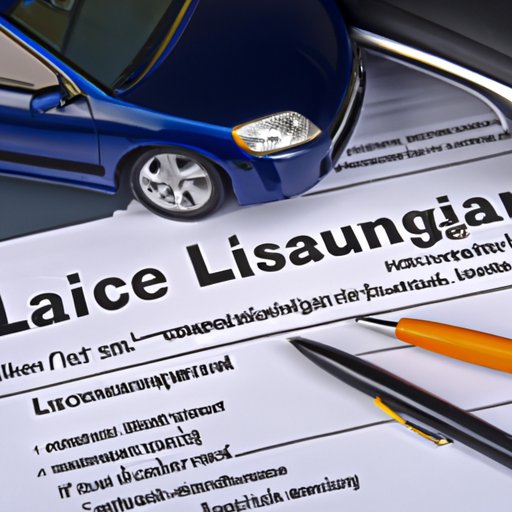Introduction
When financing a car, it is important to understand the insurance requirements and determine what type of coverage is best for your situation. Liability insurance is a type of car insurance that covers damages caused by the policyholder to other people or property in the event of an accident. This type of insurance does not cover any damage to the insured vehicle, which is why many banks and lenders require comprehensive coverage when financing a car.

Legal Requirements for Liability Insurance Coverage When You Finance a Car
The laws and regulations governing liability insurance coverage vary from state to state. Generally, most states require drivers to carry at least the minimum amount of liability insurance in order to register and operate a motor vehicle. The minimum level of coverage varies by state, but typically includes bodily injury liability and property damage liability.
In addition to state laws, banks and lenders also have their own policies regarding car insurance when financing a vehicle. Most lenders will require borrowers to maintain comprehensive coverage, which covers damages to the insured vehicle in the event of an accident. Some lenders may also require additional coverage such as collision and/or uninsured/underinsured motorist coverage. It is important to check with your lender to determine their specific requirements.
Risks of Not Having Comprehensive Insurance on a Financed Car
If you choose to only purchase liability insurance for a financed car, you are taking on a certain level of risk. If you are involved in an accident and the vehicle is damaged, you are responsible for the full cost of repairs or replacement of the vehicle. This could be financially devastating if you do not have the money to pay out of pocket.
Another risk associated with not having comprehensive insurance on a financed car is the potential for the bank or lender to repossess the vehicle. If you fail to keep up with payments and the value of the car has decreased due to an accident, the lender may have no choice but to repossess the vehicle in order to recoup their losses.
Pros and Cons of Maintaining Only Liability Insurance on a Financed Vehicle
There are both advantages and disadvantages to maintaining only liability insurance on a financed vehicle. The primary advantage is the cost savings. Liability insurance is typically much less expensive than comprehensive coverage, so opting for only liability can save you money in the short term.
However, there are some drawbacks to this approach. Without comprehensive coverage, you are exposed to financial risks in the event of an accident or other unforeseen circumstances. You are also likely to face higher interest rates on your loan if you opt for only liability coverage.

Potential Financial Implications of Choosing to Have Only Liability Insurance
If you choose to only have liability insurance on a financed car, you may be responsible for out-of-pocket expenses in the event of an accident or other covered incident. Depending on the severity of the damage, these costs can add up quickly and put a strain on your finances.
In addition, you may face higher interest rates on your loan if the lender is aware that you are only carrying liability insurance. This is because they view you as a higher risk borrower and want to make sure they are protected in the event of an incident.
Comparing Costs of Liability vs. Comprehensive Insurance for Financed Cars
When comparing the costs of liability vs. comprehensive insurance for financed cars, it is important to consider more than just the monthly premium. While liability insurance is typically much less expensive than comprehensive coverage, it does not provide the same level of protection. Comprehensive coverage not only covers damages to the insured vehicle, but also offers additional benefits such as roadside assistance and rental car reimbursement.
It is also important to consider the long-term costs associated with each type of coverage. While liability insurance may be cheaper initially, it can cost you more in the long run if you are involved in an accident or other covered incident and are responsible for paying out of pocket.

Alternatives to Full Coverage Insurance for Financed Cars
If you decide to only purchase liability insurance for a financed car, there are other options available to protect yourself financially. Gap insurance is one option that can help cover the difference between what you owe on your loan and the current market value of the car in the event of a total loss. Lease/loan payoff coverage is another option that can help pay off the balance of your loan if the car is totaled or stolen.
Conclusion
Choosing to have only liability insurance on a financed car can be a risky decision. While it may provide some cost savings in the short term, it can also leave you exposed to significant financial risks in the event of an accident or other covered incident. It is important to weigh the pros and cons and compare the costs of liability vs. comprehensive coverage before making a decision. Alternatives such as gap insurance and lease/loan payoff coverage can also provide financial protection in the event of a total loss.
(Note: Is this article not meeting your expectations? Do you have knowledge or insights to share? Unlock new opportunities and expand your reach by joining our authors team. Click Registration to join us and share your expertise with our readers.)
